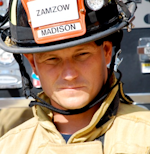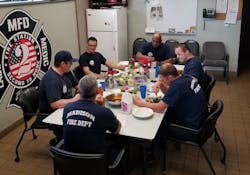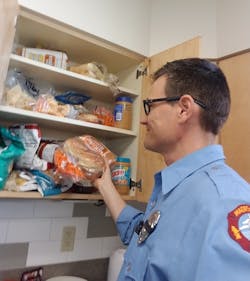There’s a popular slogan in the fitness industry that “You can’t out-exercise a bad diet.” Eating pizza, having a beer and finishing with some ice cream sounds great, but it will not help you perform or look better on the fire and rescue scene regardless of how much you exercise. Sure, that diet may have worked for you when you were 17, but as you age, your metabolism slows, and you’ve probably realized that a better performance and physique starts in the kitchen.
Eating in the firehouse—or should I say, eating healthy in the firehouse—can be a very difficult task. There is usually an abundance of baked goods from grateful citizens and really good cooks. Cooking in the firehouse is even more difficult. Cook something healthy and hear about it from your crew. Cook something tasty and it’s probably filled with calories and fat. This usually leads to large servings and excess food for later meals.
But all is not lost. There are five simple nutrition tips that will help you stay fit and keep your weight under control.
1. Out of sight, out of mind
When you walk into most firehouse kitchens, you are usually greeted with sweet smells and the sight of fresh baked goods and sweets. In most cases, you probably aren’t even hungry, but because these goodies are in front of you, you are more likely to indulge. Now I know the firehouse culture would tear you apart if you were that person to actually throw out these snacks. But that doesn’t mean you can’t put them into a cupboard or in the fridge. Let’s face it, if it is out of sight, it is out of mind. I would even go a step further and put some fresh vegetables or fruit on the table. You may get some backlash at first, but reducing the temptation is worth it.
2. Drink it up (water, that is)
One of the most important things you can do for better nutrition and a successful diet is drink enough water. Water is the key component to numerous metabolic functions in the body, including digestion and elimination. Staying hydrated can help with performance, reduce your chances of sudden cardiac arrest and strokes, and will help you curb your appetite. How much water should you drink in a day? A general recommendation is to drink eight 8-oz. cups of water per day for a total of 64 oz. This should be the minimum for firefighters. This number goes up if you exercise, work in a hot climate, or have a fire call where you lose a lot of fluid. And don’t wait to feel thirsty to start drinking water. That’s a sign that dehydration has already started to occur. Try to carry a bottle of water with you everywhere, on the truck, in your car, and around the firehouse.
3. Mom was right, eat your fruits and veggies
Fruits and veggies should be included in every meal and in as many snacks as possible. They provide the body with muscle and energy-promoting nutrients that a firefighter needs to get through the day. By loading your body with the maximum amount of nutrients for the least number of calories, they are a dietary bargain. If the fruit or vegetable in question won’t rot after a few days of hanging out on the countertop, then it’s a processed food. Make sure you choose green, leafy, lower-starch veggies over starchier types. Some examples include broccoli, kale, cauliflower, spinach and cabbage. Starchier types include potatoes, yams and sweet potatoes.
4. Lose the sweet tooth
It seems to be a common staple at any firehouse, even more so around the holidays—donuts on the table, cookies on the counter and ice cream in the fridge. But because it’s there doesn't mean you should constantly indulge. It's been well documented that sugar can have a harmful effect on your health. Research has linked this sweet substance to obesity, heart disease, liver disease, higher rates of cancer, tooth decay along with other problems. Sugar also has an addictive quality that makes it a hard “habit” to break. Start reading labels. Sugar is hidden and it often replaces fat in low-fat/fat-free foods, and you’ll find it in things that can really be made from just a few ingredients like nut butters, breads and salad dressings. Check nutrition labels to help you pick the foods with less added sugar or go for the low-sugar version. Instead of sugary, fizzy drinks and juice drinks (soda), select water or unsweetened tea. If you take sugar in hot drinks or add it to cereal, gradually reduce the amount until you can cut it out. Also, reduce desserts either in frequency or amount. It’s OK to indulge occasionally, but try to mind portion sizes when you do. It may be difficult at first to reduce your sugar intake, but after you do, I guarantee you will notice a big difference in the way you feel.
5. Mind your portions
Most firehouses not only serve an abundance of food, but they usually serve them on large plates. Let’s be honest, it does feel too good to load up your plate when you’re starving at the end of the day. But if you’re struggling to finish all of it or you feel a huge energy slump after your meal, it’s probably a sign that you’re having more food than your body needs. A simple switch of dinnerware size could be an incredibly useful solution to the large firehouse serving size. Research suggests that people eat up to 22 percent fewer calories when they’re able to decrease the amount of empty space on their plate.1 Basically, when you see a large plate with empty void around the food, the brain unconsciously assumes the plate contains less food than a smaller-sized dish with no white space. So the key is to serve your firehouse meals on smaller plates. Instead of using a big 14-inch plate for your meals, opt for an 8-inch plate. If you’re using different plates for different foods, you can switch things around to your advantage. Use bowls for salads and vegetables and smaller plates for the meat and carbohydrates. And don’t go back for seconds. It takes your brain anywhere from 20 to 30 minutes to signal that your stomach is full, so slow down your eating. You are probably full and don’t know it yet!
It takes commitment
Whether you are cooking or just eating in the firehouse (or any house), these food hacks can help but you have to apply them. Healthy nutrition takes some planning and commitment. The effort is worth it. Eat better, perform better and look better.
Resource
1. ABC News. Health Tips: Don't Let Your Kitchen Make You Fat. http://abcnews.go.com/GMA/kitchen-making-fat/story?id=12608139#.Ty9M6trhdtM

Aaron Zamzow
Aaron Zamzow is a firefighter/training officer for Madison, WI, Fire Department. He holds a bachelor’s degree in health/wellness and has 20 years of experience as a fitness trainer. He created Fire Rescue Fitness and authors programs that are aimed at getting fire rescue athletes fit for duty.







